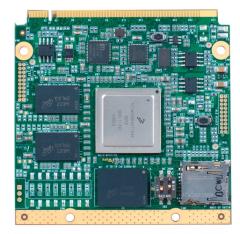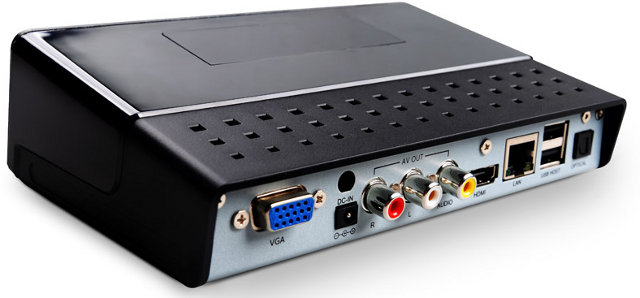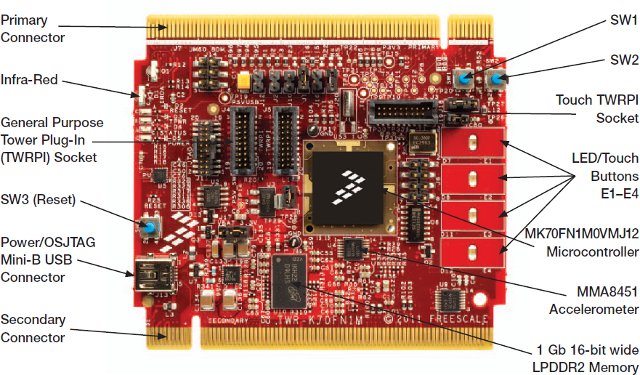iWave Systems, an embedded systems company based in Bangalore, India, has launched Qseven Modules powered by Freescale i.MX 6Quad (quad-core Cortex A9 processor), i.MX 6Duo (dual -core) and i.MX6 Solo. The Rainbow-G15M-Q7 modules are compliant with Qseven specification R1.20 and target the Industrial, Automotive and Medical markets. Here are the modules specifications: CPU: Freescale i.MX6 Cortex A9 Q/D/S core @ 1 GHz Memory: 1GB DDR3 SDRAM– Expandable to 4GB Optional 8GB eMMC Flash On-Board Micro SD slot Qseven Edge Connector : PCIe v2.0 HDMI 1.4 SATA 3.0 Gigabit Ethernet Dual LVDS LCD Support 4 x USB 2.0 Host | 1x USB 2.0 device AC97 Audio 8-Bit SD/MMC CAN1, SPI & I2C ports Debug Port Expansion Connector: 2x Camera CSI MIPI CSI & DSI 24 Bit RGB LCD IF Triple UART 4×4 Key Matrix ESAI (Embedded Software Application Interface) , SPDIF MLB (Media Local Bus), CAN2 I2C, PWM, GPIO, Memory bus Form […]
ARCHOS G9 Tablets Firmware 4.0.5 Released
Two weeks ago, Archos released the first firmware for Archos 80 G9 / 101 G9 and A70B supporting Android 4.0.3 (ICS), so it was likely a new one would soon follow to fix a few bugs. Here’s the ChangeLog: Version 4.0.5 – March 22nd, 2012 Wi-Fi: fix slow throughput and disconnections happening on some access points HDMI: solve no sound or no video output issue on some TVs Bluetooth: make sure Bluetooth does not prevent device suspend VPN: fix VPN connection failing Touchscreen: avoid loss of first finger touch while tapping with second finger The update should be done automatically OTA, but alternatively the firmware can be downloaded at http://update.archos.com/9/gen9/gen9_4.0.5/firmware_archos_it4.aos Jean-Luc Aufranc (CNXSoft)Jean-Luc started CNX Software in 2010 as a part-time endeavor, before quitting his job as a software engineering manager, and starting to write daily news, and reviews full time later in 2011. www.cnx-software.com
Android SDK Tools and ADT Revision 17 with VM Acceleration for x86 Emulator
Google has released revision 17 of the SDK Tools and the Eclipse plugin. This release brings new features and bug fixes in for Lint static checker, the build system, and the emulator among other things. Here’s what’s new for Lint in r17: Lint API Check – Added check for Android API calls that require a version of Android higher than the minimum supported version. You can use the @TargetApi annotation to specify local overrides for conditionally loaded code. New Lint Rules – Added over 40 new Lint rules for a total of over 80, including checks for performance, XML layouts, manifest and file handling. Ignoring Lint Warnings – Added ability to suppress Lint warnings in Java code with the new @SuppressLint annotation, and in XML files with the new tools: namespace prefix and ignore attribute. New Eclipse Lint UI – Improved HTML and XML reporting and Eclipse integration. Improvements to […]
Mele A1000: AllWinner A10 (Cortex A8) Based Hackable Android STB
The Mele A1000 is an Android 2.3 IP Set-top Box (STB) powered by AllWinner A10 (Cortex A8) CPU with 512 MB RAM and 2 GB NAND Flash. AllWinner A10 is the CPU to be used by the 15 USD (BOM Cost) Rhombus Tech Linux Computer, an alternative to the Raspberry-Pi. Since they do not have an alpha board yet, the Mele A1000 STB is apparently the development platform chosen by developers involved in Rhombus Tech low cost board while they wait for the hardware. Let’s have a look at the device specifications: CPU: ARM CortexA8 1GHz (AllWinner A10) Memory: DDR3 512MB RAM / 2 4GB Nand Flash OS System: Android 2.3 External Storage: Supports SD card up to 32GB, supports 2.5″ SATA HDD up to 1TB, Supports max 16GB USB flash disk Video coding: HD MPEG1/2/4.H.264.HD AVC/VC-1,RM/RMVB, Xvid/DviX4/5/6, RealVideo8/9/10, VP6 Video Format: ts/m2ts/tp/trp/mkv/mp4/mov/avi/rm/rmvb/wmv/vob/asf/flv/dat/mpf/mpeg Audio Format: MP3/WMA/WMV/OGG/FLAC/MKV Subtitle Format: SRT/SMI/SSA/ASS Network […]
uClinux Running on Freescale Kinetis K70 MCU (Cortex-M4) Module
Last year, I posted about Linux for Cortex M3 & M4 Micro-controllers and noted it was difficult to find cost effective Cortex-M based boards able to run uClinux or Linux (RAM being the main issue). Freescale TWR-K70F120M is a module based on Kinetis K70 MCU (Cortex M-4) with plenty of RAM (128MB) to run Linux or uClinux. It is available for 109 USD or 179 USD with Freescale Tower system (TWR-K70F120M-KIT). Here are the key features of the module: Freescale MK70FN1M0VMJ12 Cortex-M4 MCU @ 120 MHz (Product Brief) Touch Tower Plug-in Socket General purpose Tower Plug-in (TWRPI) socket On-board JTAG debug circuit (OSJTAG) with virtual serial port 128 MB DDR2 SDRAM memory 256 MB SLC NAND flash memory Three axis accelerometer (MMA8451Q) Potentiometer Micro-SD Card slot I could not find an open source uClinux implementation for Kinetis K70, but emCraft has a Linux Board Support Package (BSP) for the Freescale TWR-K70F120M-KIT […]
Linux 3.3 Release
Linux Torvalds announced the release of Linux Kernel 3.3 on the 18th of March: So after the extra -rc release last weekend, now the final 3.3 is out there in the usual locations. Things did indeed calm down during the last week, and the shortlog looks pretty boring. The diffstat from -rc7 is dominated by the arch/tile defconfig changes, the rest is pretty small, although there are changes spread out in various subsystems (drivers, filesystem, networking, perf tools). … And obviously, the 3.3 release means that the merge window for 3.4 is now open, although I may keep of pulling stuff for a day or so to encourage people to test the actual release. Linux 3.2 brought ext-4 and btrfs file system improvements, support for Qualcomm Hexagon processor, an improved profiling tool (perf top), and better CPU and network bandwidth management. Linux 3.3 brings the following key changes: Android merge: […]
98 Raspberry Pi Boards Left for Qt Developers
In November 2011, the Raspberry Pi foundation announced that Nokia purchased codes for 400 boards from the 1st 10,000 batch, in order to give them away to selected developers that are interested in helping develop and test Qt 5 on the Raspberry Pi. This developer program is called QtonPi. The surprising part if that they struggle to distribute all those boards. Although to date 425 people have been selected, only 302 are currently eligible to receive a board because over 100 developers did not provide their details to receive the free Raspberry Pi board namely: Their full name The link to their wiki user profile. The area of the “QtonPi Accepted Page” where they are listed. The country where the board will be shipped If by chance, you are reading this blog, have been selected but you can’t see “OK” or “CODE SENT” next to your user ID, you should […]
A Novel Approach to In-Vehicle Infotainment (IVI) – Android Builder Summit 2012
Thomas B. Rücker, Program Manager at Tieto, discusses In-Vehicle Infotainment (IVI) with Android at the Android Builder Summit in February 2012. Abstract: In the future vehicles are going to be always online. The constantly increasing number of electronic devices raises consumer expectations. Both driver and passengers want to be online. This requires new and flexible IVI and HMI solutions. Users expect intuitive and simple to operate interfaces, but at the same time they expect the systems to handle a lot of their data and apps. We are witnessing a paradigm shift in Infotainment solutions. Open software platforms will allow users to add new functionality and services, also by third parties, over the whole life-span of a product. This requires solutions that reconcile the multi-media world of consumers with traffic security requirements, in a cost effective and secure hardware platform. The presentation will highlight challenges and opportunities by bringing Android to […]






